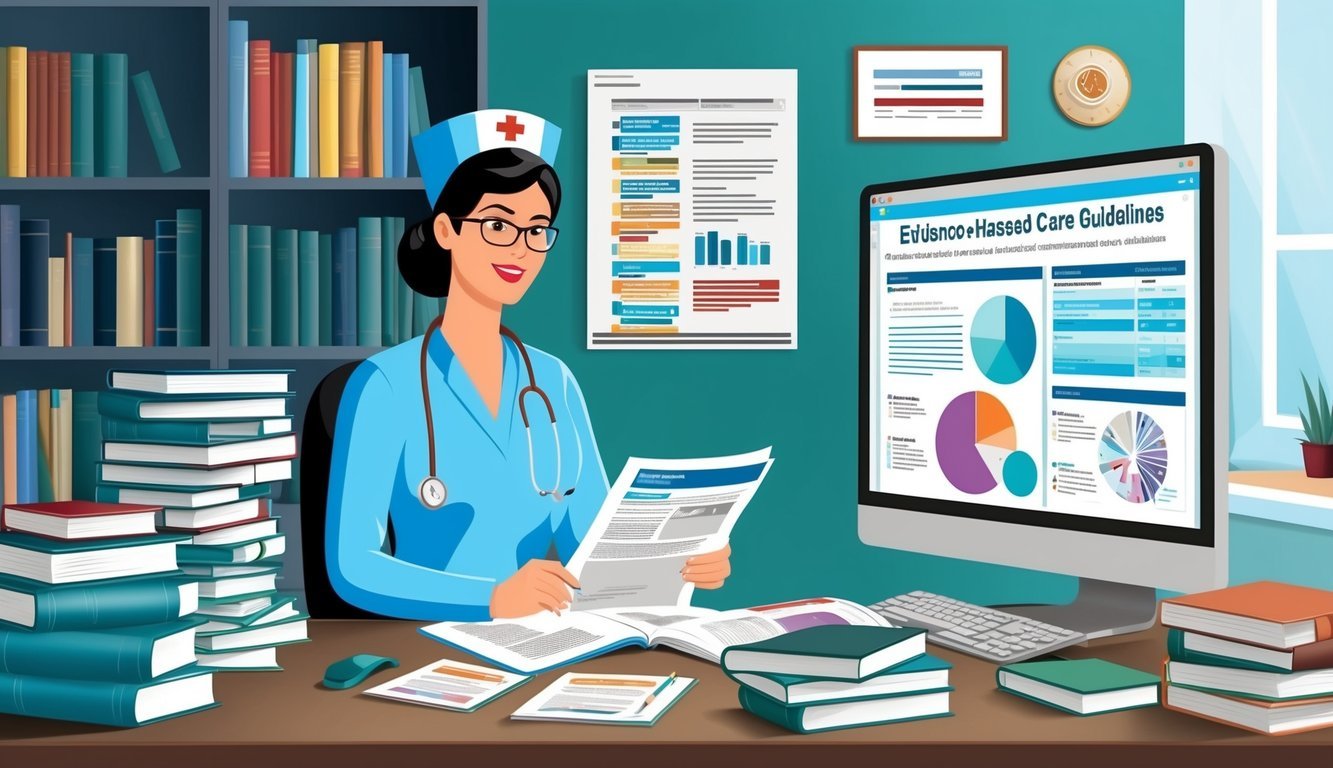Crafting a compelling cover letter is a critical step for new grad nurses entering the workforce. An effective new grad nurse cover letter not only highlights your clinical experience but also showcases your passion for patient care, making it essential to connect with hiring managers.
Understanding what to include and how to present your qualifications can set you apart from other candidates vying for nursing positions.
As a new graduate, you may feel uncertain about how to convey your skills and enthusiasm effectively.
Utilizing examples tailored to specific roles can enhance your cover letter and draw the attention of potential employers.
Referring to successful templates and tips can guide you in creating a letter that resonates with hiring managers, emphasizing your readiness to contribute to their team.
In a competitive job market, your cover letter can be a deciding factor in landing interviews.
By focusing on your unique experiences and aligning them with the employer’s needs, you increase your chances of making a positive impression.
Take the time to personalize your cover letter, demonstrating your commitment to excellence in nursing.
For more assistance, you can explore resources like NursingProcess.org to find examples and writing tips tailored for new graduate nurses.
Writing an Engaging Opening Paragraph
Crafting an engaging opening paragraph is crucial in a new grad nurse cover letter.
It sets the tone for the entire letter and can capture the hiring manager’s attention quickly.
Focus on addressing the nursing role and expressing your enthusiasm for the profession to make a strong impact.
Addressing the Nursing Role and Hiring Manager
Begin your opening paragraph by specifically referencing the nursing role you are applying for.
Clearly state the position title and the healthcare organization.
This shows you have tailored your letter, which conveys professionalism.
Use a warm greeting and personalize it when possible.
For example, instead of a generic “To whom it may concern,” try to find the name of the hiring manager.
Example greeting:
- Dear [Nurse Manager’s Name],
By mentioning the specific nursing role, you demonstrate your genuine interest in that position.
This connection with the job can help set you apart from other candidates.
Referencing the organization’s values or mission can further strengthen your introduction.
Conveying Enthusiasm for the Nursing Profession
Your passion for nursing should shine in this opening as well.
Use phrases that illustrate your dedication and eagerness to contribute to patient care and the healthcare team.
Consider including a sentence about your motivation for pursuing a career in nursing.
This could be a personal anecdote or an experience during your education that highlighted your commitment.
Example sentence:
- “My clinical rotations reinforced my desire to support patients and advocate for their needs in a compassionate manner.”
Expressing enthusiasm can make your cover letter more engaging, prompting the hiring manager to want to read further.
Make sure to choose words that reflect your excitement about the opportunity while maintaining a professional tone.
Showcasing Your Nursing Education

Your nursing education is a critical component of your cover letter.
Effective presentation of your clinical rotations and academic accomplishments can set you apart from other candidates.
Focus on specific experiences that demonstrate your capabilities in the nursing field.
Highlighting Clinical Rotations and Experiences
When discussing your clinical rotations, emphasize the variety of settings you encountered.
Include details about significant experiences in different specialties, such as pediatric nursing and medical-surgical nursing.
For example, list your clinical rotations in a table:
| Specialty | Institution | Duration |
|---|---|---|
| Pediatric Nursing | City Children’s Hospital | 8 weeks |
| Medical-Surgical Nursing | General Medical Center | 10 weeks |
In your cover letter, describe key skills you gained during these rotations, such as patient assessment and care planning.
Highlight any challenging situations you handled effectively, which demonstrates your preparedness for real-world nursing.
Integrating Nursing Principles and Education Achievements
Incorporate relevant nursing principles in your cover letter to show your understanding of the profession.
For instance, mention your education in evidence-based practice, patient-centered care, and ethical decision-making.
Include your academic achievements, like:
- Bachelor’s Degree in Nursing from a recognized institution.
- Any special honors or awards received during your studies.
These details not only reflect your dedication but also reassure employers of your strong foundation in nursing.
Make sure to relate these principles to your practical experiences when applicable, showcasing a comprehensive understanding of both theory and practice.
Consider using bullet points for clarity:
- Strong foundation in evidence-based practice
- Experience in patient assessment and care
This approach will create a compelling narrative about your readiness for a nursing position.
Emphasizing Relevant Skills and Experience
In a new grad nurse cover letter, highlighting your relevant skills and experience is essential.
This section will focus on how you can effectively present the skills gained from clinical rotations and how your academic learning translates into patient care.
Detailing Skills Gained from Clinical Rotations
During your clinical rotations, you developed a variety of nursing skills that are invaluable for your nursing career.
You gained practical experience in areas such as:
- Patient Assessment: Conducting thorough assessments to identify health issues.
- Medication Administration: Learning safe and effective medication administration techniques.
- Communication Skills: Enhancing your ability to communicate with patients and their families.
These experiences are important to mention in your cover letter as they demonstrate your readiness for the nursing role.
You can also discuss specific scenarios where you applied these skills, making your application more compelling.
Resources like NursingProcess.org can provide additional examples.
Transitioning from Academic Learning to Patient Care
Your academic background lays the foundation for practical nursing skills.
Throughout your education, you learned critical concepts, such as:
- Evidence-Based Practice: Understanding how to apply research findings to improve patient outcomes.
- Patient Safety: Prioritizing patient safety in all aspects of care.
- Ethical Standards: Upholding ethical standards when making clinical decisions.
Highlight how these academic experiences translate into meaningful patient care.
For instance, you might mention specific projects or coursework that prepared you for real-world scenarios.
This connection shows potential employers that you possess both theoretical knowledge and practical readiness for nursing, enhancing your appeal as a candidate.
Demonstrating Commitment to Evidence-Based Care

A strong emphasis on evidence-based care in your cover letter shows prospective employers that you prioritize patient outcomes and utilize best practices in nursing.
Highlighting your understanding and experiences with evidence-based practice can demonstrate your readiness for a nursing role.
Understanding of Nursing Best Practices
To convey your commitment, start by articulating your grasp of evidence-based care.
This approach integrates the best research evidence with clinical expertise and patient values.
Key components include:
- Research: Staying informed on current studies related to nursing interventions.
- Clinical Expertise: Applying personal experience to inform care decisions.
- Patient Values: Considering individual patient preferences and circumstances.
Possessing this knowledge illustrates that you are prepared to provide compassionate care while ensuring interventions are effective and scientifically supported.
Such a foundation leads to enhanced patient outcomes, aligning with the goals of modern healthcare.
Sharing Examples of Evidence-Based Practice
Highlight specific instances where you implemented evidence-based practices in your clinical training.
Be precise about your role and the impact of your actions.
For example, you could detail a situation where you applied a new care protocol that improved patient recovery times.
Emphasize your collaboration with healthcare teams to incorporate research findings into daily practice.
Consider creating a brief list showcasing:
- Practice Change: Describe a protocol adopted.
- Patient Outcomes: Note improvements observed.
- Team Collaboration: Mention any interdisciplinary efforts.
This tangible evidence demonstrates your proactive approach and dedication to continual improvement in nursing practice.
Referencing your ability to merge research with clinical application solidifies your candidacy in a competitive field.
Concluding Your Cover Letter Strongly
A strong conclusion will leave a positive impression on potential employers and reinforce your passion for the nursing profession.
Emphasizing your enthusiasm and providing a clear call to action can significantly enhance your cover letter.
Reaffirming Interest in the Nursing Career
In your closing paragraph, it is essential to reaffirm your commitment to pursuing a career in nursing.
Express your passion for the field and mention specific aspects of nursing that resonate with you, such as patient care, teamwork, or continuous education.
You might say, “I am excited about the opportunity to contribute to patient well-being and work alongside dedicated healthcare professionals.” This statement reinforces your desire to be an active part of the nursing community.
Highlight any relevant experiences or skills that support your intent, including clinical rotations or volunteer work.
This adds depth to your conclusion and assures the reader of your readiness to transition into this challenging role.
Closing with a Call to Action and Thanking the Reader
Your cover letter should conclude with a compelling call to action that encourages the reader to take the next step.
Phrases like “I look forward to the opportunity to discuss my application further” signal your eagerness for an interview.
Make sure to thank the reader for their time and consideration.
A simple acknowledgment, such as “Thank you for considering my application” or “I appreciate your time in reviewing my credentials,” leaves a positive final note.
This approach demonstrates professionalism and respect for the hiring manager’s workload.
Crafting a polite and persuasive ending can set you apart, increasing your chances of landing an interview.
Additional Considerations for Your Cover Letter
When crafting your cover letter, it’s essential to make it relevant to the specific nursing position you’re targeting and to demonstrate your commitment to ongoing professional development.
These elements can significantly enhance your chances of standing out in a competitive job market.
Tailoring the Letter to Specific Nursing Fields
Tailoring your cover letter to the specific nursing field is crucial.
Each specialty, such as pediatrics or geriatrics, has distinct responsibilities and required skills.
Being specific shows prospective employers that you understand the nuances of the position.
Tips for Tailoring:
- Research the Role: Familiarize yourself with the job description. Then, highlight your experiences that align with the duties outlined.
- Use Relevant Keywords: Integrate terms from the job posting into your letter. This increases the chances of passing through applicant tracking systems.
- Show Passion: Express your enthusiasm for the particular nursing field. For example, if applying for a pediatric nurse position, share experiences involving children or education in child health.
To see examples, refer to various nurse cover letter examples.
Continuous Professional Development and Career Growth
Employers find your commitment to ongoing professional development appealing.
It signals that you prioritize enhancing your skills and staying updated with industry standards.
Mention any relevant certifications, workshops, or courses you’ve completed since graduating.
Professional Development Highlights:
- Certifications: Include any additional qualifications, such as Basic Life Support (BLS) or Pediatric Advanced Life Support (PALS).
- Continuing Education: Discuss any relevant classes or training focused on newer practices or technologies in nursing.
- Professional Organizations: If you’re a member of organizations like the American Nurses Association, mention this to demonstrate your dedication.
Showcasing your engagement in continuous learning positions you as a proactive candidate.
This shows that you are ready to contribute to the organization and improve patient care.

